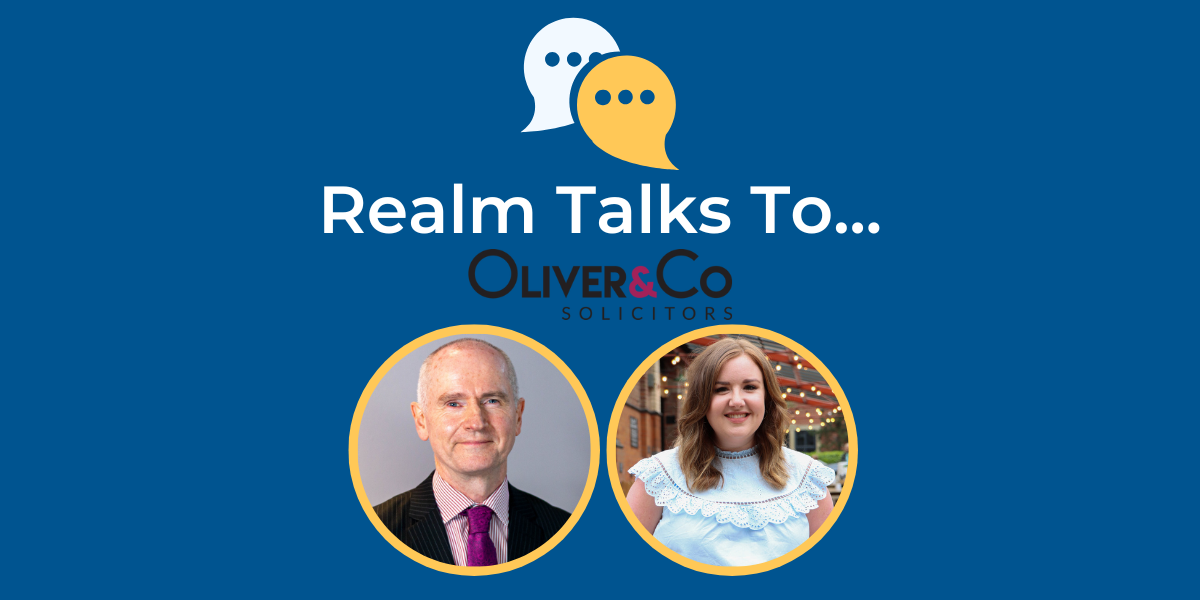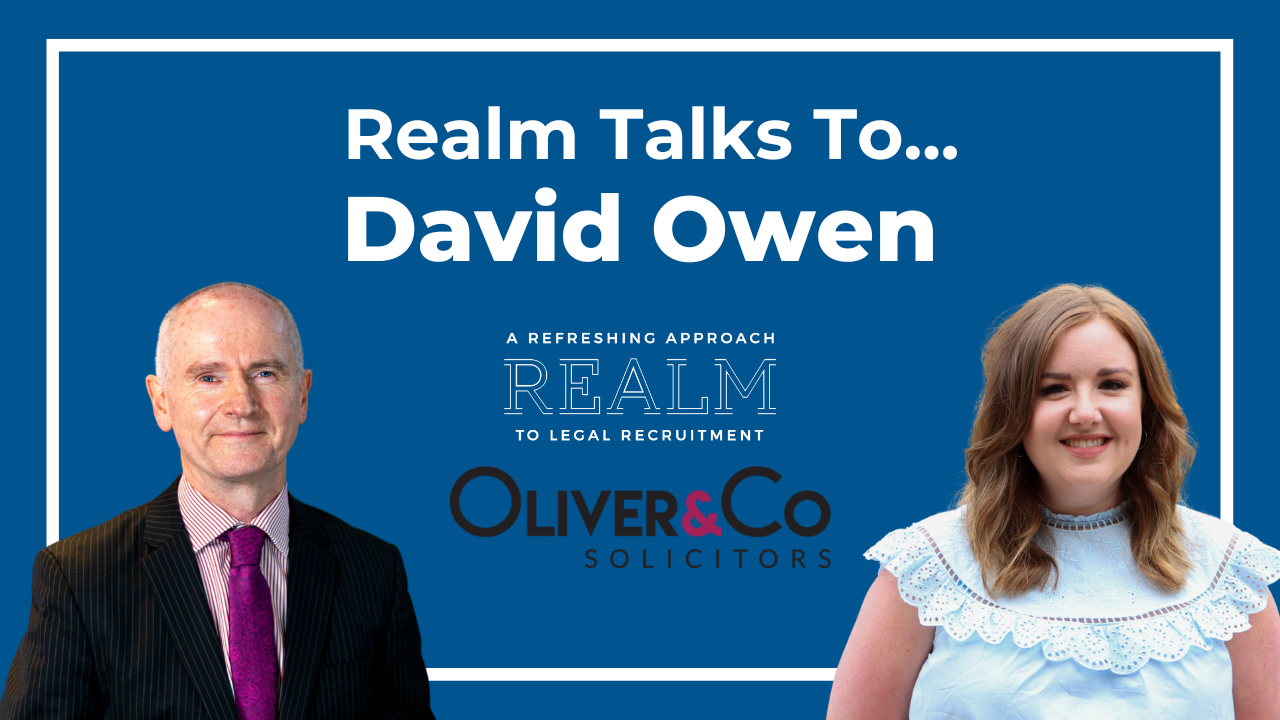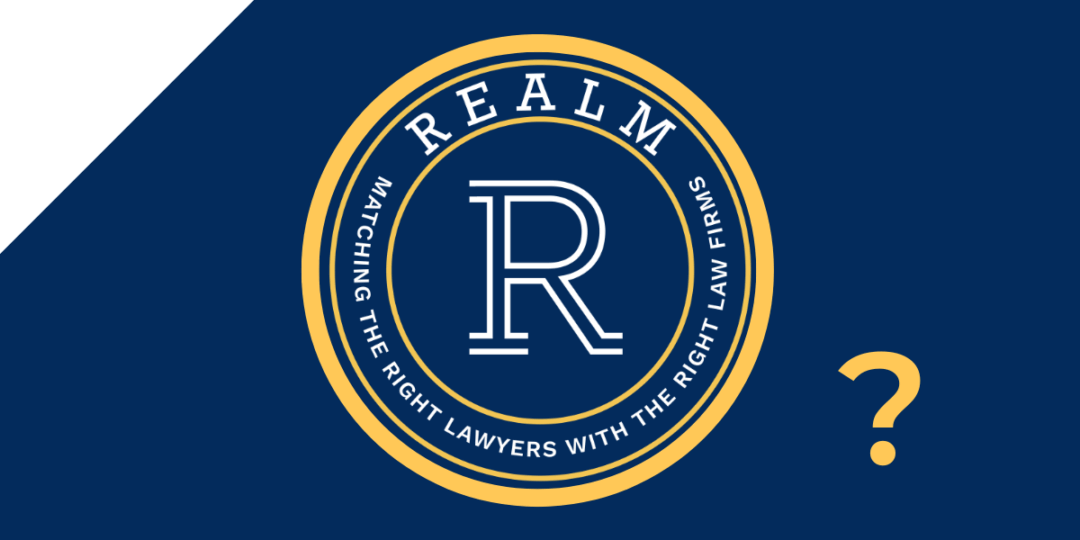SG: Hello and welcome to this edition of Realm Talks To. In this episode, I’m really pleased to be joined by David Owen, director of Oliver and Co Solicitors Legal 500 firm based in Chester and only one of a handful of law firms in the North West that have become employee-owned.
Welcome David. To begin with, could you just maybe talk us through the decision behind adopting an employer ownership model at Oliver and Co and how you came to that decision?
DO: It was part of our succession planning strategy. Kay Cook and I who were the two shareholders at the time had to consider what we were going to do for the future, and we’d been at the company for over 20 years. There were a couple of options – we could go for a sale to a third party or employee ownership suddenly appeared as an option. So, having considered it, we thought being employee-owned was a great way of passing the firm effectively back to the employees. They’d helped make the firm what it was, and so it seemed a really fair way of effectively disposing of the firm in terms of a management buyout, which was an option that involved people scrambling around for cash and the other option was to sell to a third party and quite often you get the third party which comes in and basically they will impose their values and their culture on you, the smaller firm. So, we really wanted to retain the culture of the firm and the way of doing that we felt was to pass the firm back to the employees, who as I say, have made the firm what it is today.
SG: That’s brilliant and I think that is something that we’re hearing a lot, that firms get to a stage where they have to think about succession. And the fact that this is now an option just feels like the right fit for some firms. And the idea of being able to pass the firm on instead of, I’m sure you know these horror stories that that we all hear rather in terms of like mergers and things like that. And it’s because you’re really proud of the culture that you’ve built at the firm and it’s something that you really kind of want to retain and know that that that’s kind of a legacy as you and the other partners move on.
DO: Yeah absolutely. We worked really hard on the culture and creating a happy work environment. Happy employees normally mean happy clients, so it’s really important to us to retain that culture and the Oliver and Co brand really going forwards which could get sucked up or lost in a trade sale.
SG: Yeah. And I guess it’s important to your clients that have been working with your firm for years and years I’m sure that the firm does stay intact in terms of its structure, its values and the service it offers. So I guess it’s also your clients that you’ll be loyal to as well as your employees.
DO: Yeah, we’ve had very positive feedback from clients and certainly potential new clients who realise that we’re employee-owned. We’ve already seen some clients come to us because we’re employee-owned. They like the fact that they’re going to get some improved client service because obviously everyone from the first point of contact to the more senior people are all invested. They’ll all get shares of profits and clients know that and they know about the John Lewis model. Lots of people have heard about that and, you know, they’re quite intrigued and it is quite innovative, I think for a law firm to become employee-owned.
SG: That’s really, really interesting. And something I’ve not sort of heard or thought about before actually, is that idea that people work with businesses not just because of what they offer but why they offer it and I think the idea that you’ve actually won new clients because of you becoming employee-owned is a really interesting concept which I think will be of interest I think to a lot of other firms as well.
Could you tell us a little bit more about how your existing team has reacted to the change and how it’s benefited them?
DO: It’s really positive, everyone’s taking it very positively. I mean the benefits obviously are in terms of a profit share and they get to have a share of the profits, so once everything else has been paid off in the firm if a profit share is declared, employees will get an equal share of the profits. We had a profit share payment before Christmas. There’s no income tax that’s paid on the first £3600 pounds of a profit share payment during any one year. So that’s a significant benefit to you know to them really.
Also, they have elected 5 employee representatives, two of those now will have an opportunity to come to trustee meetings which take place once a quarter and you know, put forward views that hopefully, you know, help improve the firm. So, it’s twofold really there’s a cash benefit which affects people in the pocket, so it was nice for them to have that cash payment just before Christmas and we’ve got the cost of living and inflation and all of that at the moment and then also more of a direct say in the running of the business. So those are the two big benefits to them, and they’ve taken that on board and there’s been absolutely fantastic feedback
SG: That sounds brilliant and you’re right, obviously the cost of living is something that’s on everyone’s mind, so I’m sure the team has been really motivated by the idea of that tax-free money in their pockets, that makes complete sense.
Have you seen or do you expect to see because of that increased productivity and presumably increased profitability? Do you expect this to be a driving factor in the success of the firm in the years to come?
DO: I suppose we started off as a small family firm many years ago and it’s got bigger and bigger. We’re already becoming more professional in terms of we’ve got trustees, we have an external trustee who’s a managing partner of the first law firm that became employee-owned. We have a chartered accountant who helps us with setting targets and looking at our finances which we’ve tended to do in-house before. So we’ve become more professional and so the setting of targets that everyone’s going to buy in – we’re involving all the staff with the targets that we’re going to set and then they can see the rewards if those targets are met and everyone can work as a team towards achieving those targets. We certainly think profitability will improve. We’re going to have increased engagement, hopefully, increased loyalty and hopefully in terms of recruitment as well, we’ll be able to attract staff through having a totally different type of business model.
SG: Really interesting. It’s interesting to think of this from that perspective of it not only being a succession plan and a solution to that but also a real catalyst in terms of bringing the firm into its next phase of growth. And so it’s kind of like a twofold positive, isn’t it?
DO: Absolutely, the David and Kay era is probably, most not completely over because we’re still here in the senior positions, but it’s almost like it feels the firm should now move to the next level. With external people such as accountants and former managing partners of successful law firms having input into the running of the firm, we can certainly aim for bigger and better things.
SG: With you and your partner caretakers that process?
DO: Absolutely. We’ve seen the firm evolve over the last 20 years and change beyond recognition. I remember the days of typewriters and I’m showing my age there, but it really, it has evolved, but it’s still got a lot of evolving to do and still a lot of improvements. But you know, I think most firms would probably say that. We think as I say, getting the engagement of all the staff, involving them.
We’ve been having presentations where me and one or two others have talked about what it means to be employee-owned and we’ve not just made the announcement and carried on. We’ve had continuing talks with the staff to keep them fully informed as to exactly what’s happening. And we’ve had leadership development training with all the heads of departments carried out by the former managing partner of the first law firm that became employee-owned. A lot’s happened in the last few months, and we aim to hopefully grow the turnover and grow the profit of the firm.
SG: It sounds like it’s been a real process then, it’s not just been a switch that was flicked on overnight and you became employee-owned. It’s been a real process and you’ve really taken your team along with you on that journey. I think that point about you not just telling them once but continuing in that communication and bringing in people that have had the experience of this exact transition has been really important to that process.
DO: Yeah, absolutely, keeping everyone engaged so that it’s not just a little bit of a fad. It’s important to take really little steps. You don’t just do dramatic drastic things too quickly. In terms of the management effectively what happens is the owners which have been myself and Kay, give up control because the firm has become 100% employee-owned. So we’ve given over control, but it’s in the interests of the firm that we stay involved certainly for a period of time to help to transition to employee ownership and you know obviously we have a good idea and a good understanding of how the firm has evolved over the years, so it’s a case of passing on that knowledge and guiding and steering others that are becoming more senior in the path forwards really.
SG: It must be so satisfying to see that happen. It must be so satisfying to see the people that have worked for you for all these years or with you at least kind of stepping up and taking that next step with your help. It must be a very rewarding feeling for you.
DO: Oh absolutely. It’s not just myself and Kay now, we can’t just make decisions ourselves. We have an interim management board at the moment and a couple of directors that have come onto that board. So seeing how they’re progressing and how other heads of departments have progressed as they’ve involved their teams with what has happened and have tried to get them more engaged. Having team meetings, looking at ideas and getting the ideas of all the employees within their departments.
I mean all employees can certainly help with the costs of a firm in terms of turning lights off and you know, using less paper which people become more aware of. But you know, I feel that all employees can also help with business development. You know, family members and friends moving house, wanting to make a will, having had an accident and they’re going to be far more likely to try and persuade those people to at least have a conversation with us before going elsewhere. And so, you know, that increased engagement is great. So seeing how some of the heads of departments have developed and brought their teams along is very satisfying.
SG: Yeah, another great point there, I think in kind of almost turning all of your employees even further into ambassadors and champions of the firm and you’re right, if it’s you know directly going to be going back into their pocket, I guess it gives them more ownership over the success of the firm, doesn’t it and sort of empowers them and hold them more accountable for doing things like that.
We touched on recruitment earlier and I think that’s a really important point. We know as a recruitment consultancy that firms that have a happy, engaged, productive team are going to be more likely to be able to attract the talent that that is right for their business. And the firms that communicate very well what the culture and the values are of their business (what we’d call their employer value proposition) are going attract the right people who have the right values and the right culture fit. We know that the people going into those firms are going to be happy and more productive, have better well-being and progress faster.
In terms of how you see this kind of fitting in with your recruitment strategy, has it already positively impacted your ability to recruit and do you see that as something that will continue to develop in the future?
DO: At the moment it’s probably too early to say as we only became employee-owned on the 18th of October of last year, so we’re not six months down the line yet, but certainly the early signs are extremely encouraging and whenever we’ve interviewed someone in recent months, they love the fact that we’re employee-owned. And I think we feel that if we make an offer, they’re far more likely to accept that offer as a result of being employee-owned than they would if we weren’t employee-owned. So it’s certainly helping when we’re interviewing candidates and it’s really, I suppose it’s more of a marketing thing for us really in terms of we’ve got to try and get the message out there that we are employee-owned, which we are trying to do and by doing that, people will have the opportunity then to come for an interview and see what they think. We are the first law firm in Chester to be employee-owned and the biggest in the North West to be employed-owned. I’m sure firms are going to follow and become employee-owned, but I think I like to think we’ve got a bit of a head start on it. So yes, so for those people who aren’t looking for somewhere with a top-down sort of structure where there’s just going to be orders coming in from the top. But departments will be involved in each one in the discussions as to how to make the departments more profitable and so a lot more engagement. So, it’s getting that message across to prospective candidates and to get it out in the market there that there is a different law firm and there are firms out there that operate in a different way.
How trainee lawyers are going to get a profit share and how many paralegals are going to get a profit share? So for me, that’s what sets us apart as lawyers will have some significant benefits.
SG: Yes. And they’re not going have to wait you know 20 years or so or whatever it would be to get to the stage where they would not only have a profit share but as you said earlier, that say in the direction of the business and a kind of real autonomy within the business.
What else do you think apart from this kind of sets Oliver and Co apart as an employee? We’ve talked about your culture and your values and a bit of the history of the firm and where it’s come from, and it sounds like a great place to work. Why do you think people love working for you and what sets you apart?
DO: Well, we try and work out whether people are Oliver and Co, which means they going to be friendly, loyal and enthusiastic. Those are probably the 3 Oliver and Co characteristics. I mean in terms of benefits we have; we have very generous holidays. We offer 28 days of annual leave on top on top of bank holidays. We do simple things like providing free fruit. We have seminars for financial well-being and health and nutrition delivered by people from outside the business.
We want to provide an environment whereby employees feel challenged and are happy and have fulfilling employment and we place a huge emphasis on personal development, so there’s lots of training. We are in quite a few networking groups. We try and encourage paralegals, trainee solicitors to get out and go to the networking group so it’s not just about studying from books, it’s actually you know, meeting people and doing presentations and so, yeah, there’s a big emphasis on that as our firm as well. So, I do think we already had a lot of very positive points prior to being employee-owned which we can now work upon and improve and add to going forwards.
SG: Definitely, it sounds to me like a place where you’re not just able to have a career but you’re able to have a life as well as work-life balance and the well-rounded experience of Enjoying going to work and liking your colleagues and having lots of time as you say to go out and meet with businesses, people in the community and develop those well-rounded skills that will set you apart for the future.
DO: I think that’s absolutely right. Networking is huge, so we try and encourage that. I didn’t do it when I was younger, and I think I missed a trick. It’s great for the younger members of staff to go out at a really early age and do that work. We also have a social committee that arranges events like end-of-the-month drinks. So you’re right, it is that sort of work-life balance and people become very good friends here and those friendships continue, you know, whether people move to different firms or whatever. You know, you spend a lot of time at work, so it’s absolutely great, isn’t it if you get on with those colleagues and you can have a really positive working relationship with them.
SG: Definitely, you were probably sitting behind your typewriter, weren’t you? That’s probably why you weren’t out at networking events.
DO: It was, it was dictation machines and typewriters. I can remember having a secretary on a typewriter typing up a will, and of course, if you made a mistake, you’d have to rip it up the rule and start again. It was unbelievable and I can remember those days! That’s quite scary, isn’t it?
SG: The sort of thing that trainees now won’t believe I’m sure! At Realm, our vision is for all lawyers to be matched with the right law firms, so it’s great that you can so clearly articulate what makes someone an Oliver & Co team member and what they get in return. You seem to do a lot of fundraising as a team. I’m getting a real sense of community about your firm – is it important for you to give back to that community?
DO: Yeah, absolutely. We set up a Corporate Social Responsibility committee quite a few years ago now. And that’s sort of developed and evolved, so that we have representatives from most departments involved in that committee and they meet on a regular basis. And yeah, there’s a genuine desire of the company and the employees to give back, to have a positive impact upon employees, the environment and the community. We have a charity of the year, which gets nominated by the employees every year, and then we hold a number of events to raise money for that charity of the year. We’ll have a charity quiz. We’ll have cake sales. We had an exercise bike challenge and there’s the opportunity for lots of people to get involved, we’ve had people volunteering for charity so yeah that’s all borne out of a genuine desire for Oliver and Co to give back really and the employees to give back.
SG: Brilliant. Apart from the spin charity classes, tell us something we wouldn’t already know about Oliver & Co.
That’s quite a difficult question really. We have had some absolutely incredible settlements in medical negligence and industrial disease, some of the biggest settlements in the country. But probably what we’re probably most proud of is that I think over the last five years we’ve given over £130,000 to charity and donated to 27 different charities. So, it’s that giving back that stands out for us. People probably don’t quite know the figures and the amount of charities that that that have been supported.
SG: That’s amazing. So not just giving back on the charity side but again the impact of those settlements presumably on the lives of the people that were involved.
DO: well, well absolutely, because they weren’t just average settlements, they were absolutely huge in the areas. For confidentiality reasons, you can’t really talk about the cases, but we think they were probably some of the biggest settlements in legal history. So yeah I mean that’s obviously on the legal side and the giving back also, in terms of the figures, when we tot up the actual amount that we’ve raised for charities over the year, it shows a real desire from the employees here to give really give up time and money.
SG: Brilliant. Well, thank you so much for joining me today to talk more about Oliver and Co, your employee-ownership model and some of the other things that maybe we didn’t perhaps know about the film before. I’ve really enjoyed speaking to you and I think I can safely say that’s been a job very much well done for yourself and Kay. So thank you very much for joining us.
DO: No. Thank you for giving me an opportunity to speak.
SG: Brilliant. Thank you.





